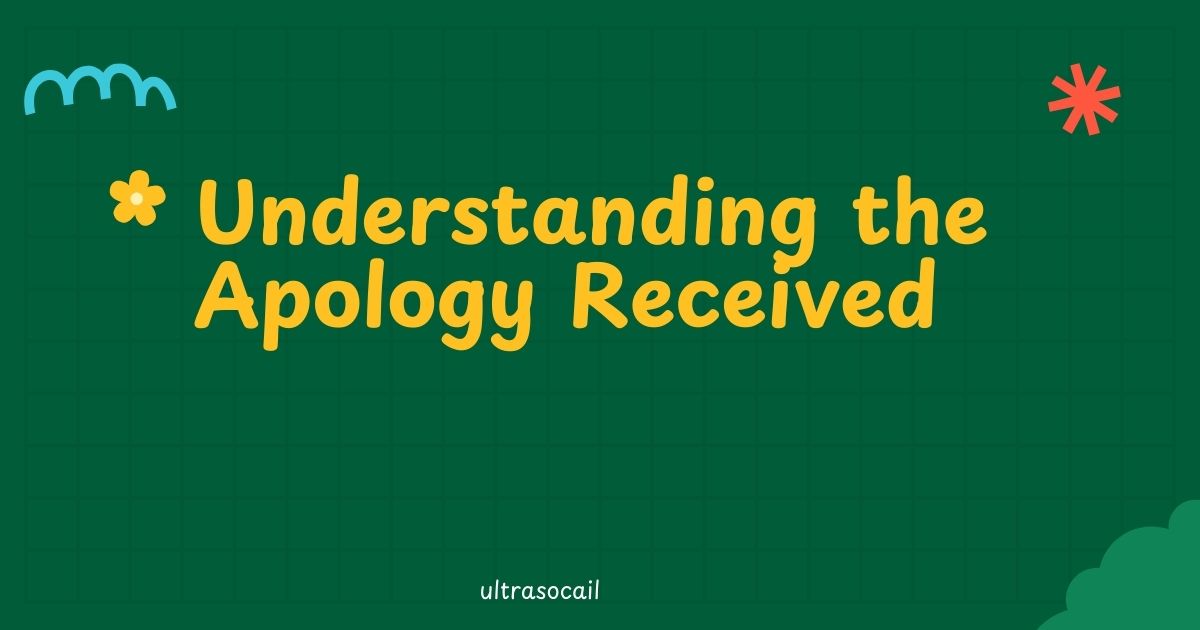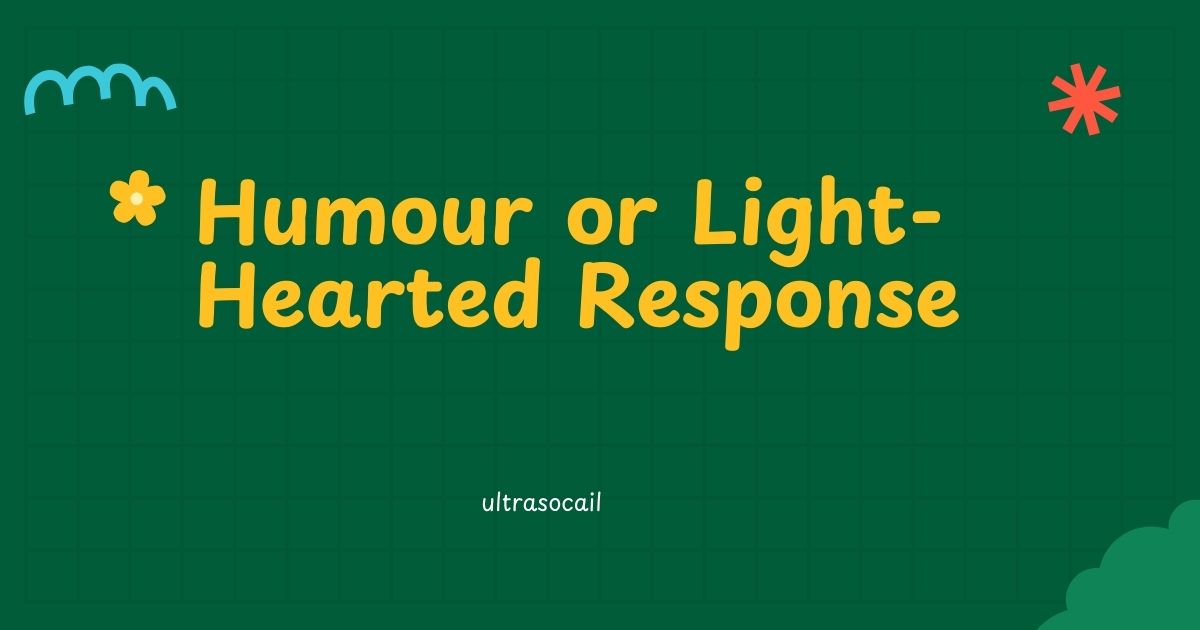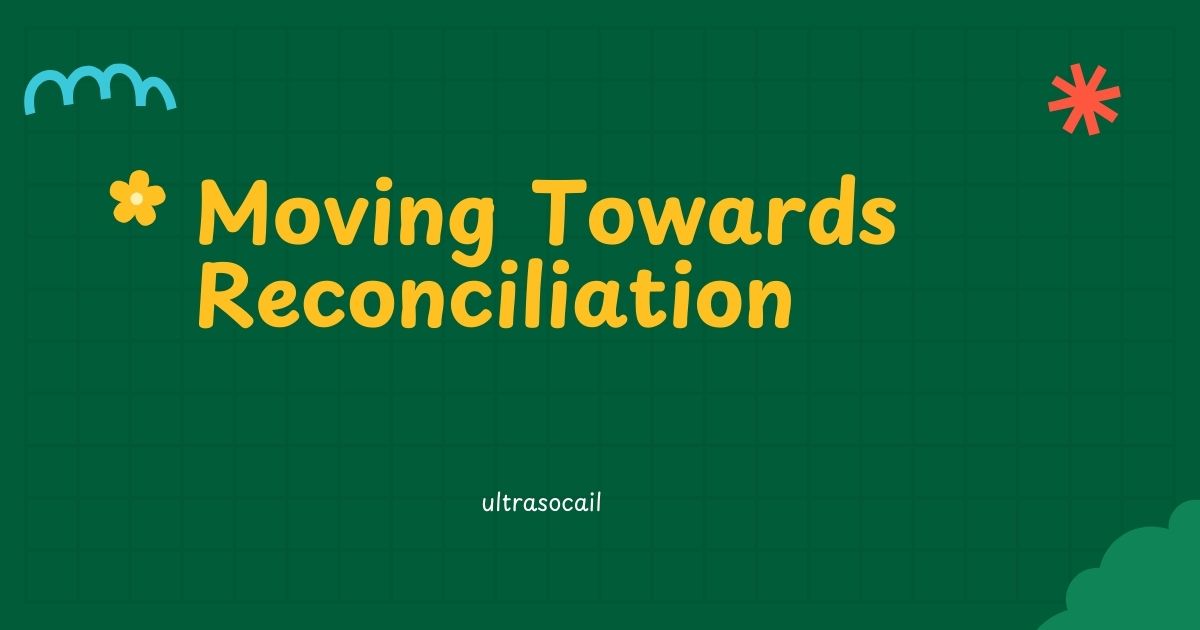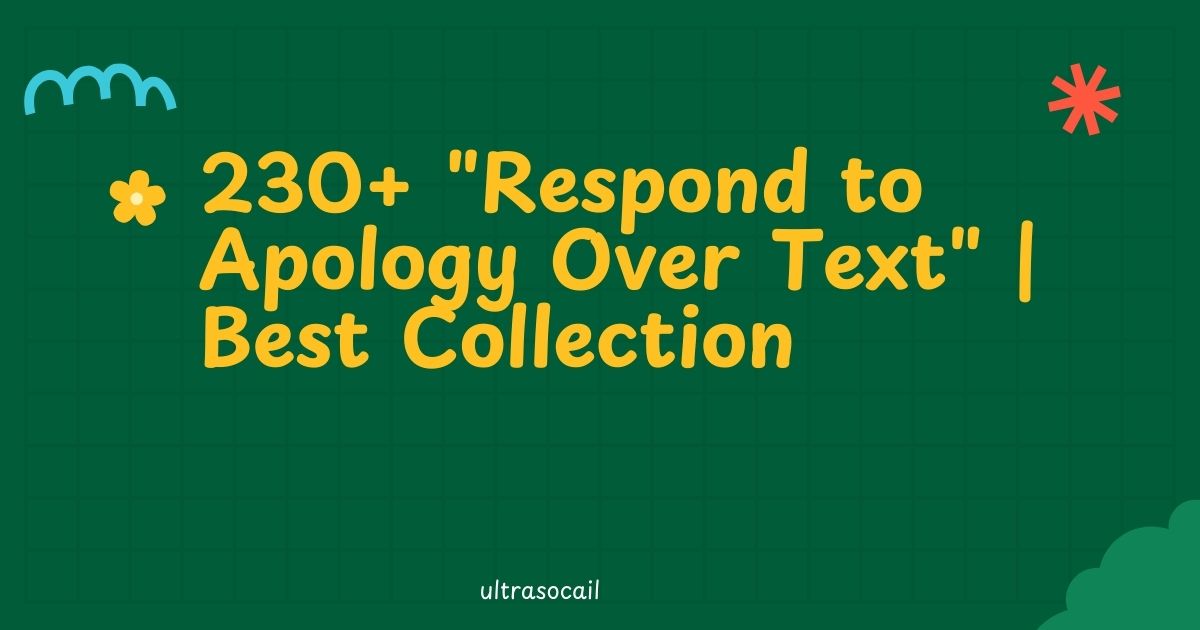Responding to an apology can feel like navigating a tightrope, especially when the conversation takes place over text. The challenge lies in finding the perfect words to express your feelings whether you’re ready to accept the apology or still grappling with a whirlwind of emotions. The nuances of “Respond to Apology Over Text” can significantly impact the outcome of the conversation, making it essential to choose your words wisely.
In this article, you’ll discover a treasure trove of quotes specifically curated to address various contexts and emotions related to “Respond to Apology Over Text.” Each quote provides a fresh perspective on the intricate dynamics of apology responses, empowering you to find the phrases that resonate with your experience. Whether you’re seeking understanding, forgiveness, or clarity, this collection will guide you in crafting the ideal response.
Understanding the Apology Received

Receiving an apology can be a pivotal moment in any relationship. A genuine apology typically includes acknowledgment of wrongdoing, expression of regret, and a commitment to change. By reflecting on these elements, you can better assess the sincerity behind the words and how they affect your feelings about the situation.
Active listening is crucial when processing an apology. Pay attention to not only what is said but also the tone and context. This can reveal underlying emotions and intentions, helping you determine whether the apology resonates with you. A sincere apology can pave the way for healing, while an insincere one may require further conversation to address unresolved feelings.
Humour or Light-Hearted Response

- “Apologies over text? They’re like taking a shortcut to an emotional rollercoaster!”
- “When life gives you apologies, respond with humor. Laughter can heal the heart.”
- “I’ll accept your apology, but only if you promise to never send me another meme!”
- “Apology accepted! Let’s just pretend it was all a bad dream.”
- “Texting an apology? You must really want to avoid my wrath!”
- “Your apology is like Wi-Fi. I’ll take it, but it better be strong!”
- “Accepting Respond to Apology Over Text is easier than explaining it to my coffee mug!”
- “Texting apologies is like sending smoke signals. Let’s just hope they reach me!”
- “I accept your apology, but only if you agree to dessert next time!”
- “If I had a dollar for every text apology, I’d have a very cushy couch!”
Initial Reactions and Emotions
- “Receiving an apology can feel like a wave crashing on the shore of your emotions.”
- “Respond to Apology Over Text can stir feelings like a gentle breeze or a raging storm.”
- “My heart does a double-take when I read an apology in my inbox.”
- “Your text felt like a lifebuoy thrown into the sea of my emotions.”
- “Every apology text brings a mix of relief and unresolved feelings.”
- “Apologies can feel like a warm hug or a cold shoulder, choose your words wisely.”
- “In the moment, a text apology can lighten the burden or deepen the hurt.”
- “Every apology I receive makes me reflect on the journey, not just the destination.”
- “The first reaction to an apology often dictates the course of healing.”
- “Apologies over text can turn chaos into clarity, but only if you let them.”
Composing Your Response
- “Crafting your response is as important as the apology itself, choose wisely.”
- “Your reply can be a bridge or a wall; make sure it leads to understanding.”
- “Responding requires thought; let your heart guide your fingers.”
- “A meaningful reply can transform an apology into a stepping stone for healing.”
- “Composing your response like a chef creating a delicate dish balance is key.”
- “Each word you type carries weight; ensure it reflects your true feelings.”
- “When replying, remember: honesty wrapped in kindness is a powerful combo.”
- “Your response should invite dialogue, not close the door on healing.”
- “Take a breath before you hit send; thoughtful replies pave the way for growth.”
- “Crafting your reply should feel like an art, with each word chosen with care.”
Crafting a Meaningful Reply
- “A meaningful response can turn a simple text into a heartfelt conversation.”
- “Let your reply echo your understanding and openness; it nurtures connection.”
- “In every apology lies a chance to deepen your bond; respond meaningfully.”
- “Your meaningful reply should acknowledge feelings while paving the way for trust.”
- “Crafting a reply is not just about words; it’s about fostering emotional connections.”
- “A sincere response shows that you value the relationship and want to move forward.”
- “Meaningful replies foster growth, transforming hurt into understanding.”
- “In your response, reflect on the impact of the apology. It can guide your words.”
- “Let empathy drive your reply; it can heal wounds faster than time alone.”
- “Meaningful replies are the threads that weave the fabric of relationships.”
Moving Forward
- “An apology is just the beginning; let your response help you both move forward.”
- “Moving forward requires understanding and a willingness to rebuild trust.”
- “Use your response as a stepping stone to a stronger relationship.”
- “Every apology opens the door to a new chapter; be ready to write it.”
- “To move forward, both parties must acknowledge their feelings and share their truths.”
- “Responding to an apology means embracing change; let it guide your journey.”
- “Your reply can clear the path ahead; choose it with intention.”
- “Let your response mark the beginning of a fresh start, not a lingering shadow.”
- “Moving forward takes courage, but your response can pave the way.”
- “In every reply lies the power to heal and to renew your connection.”
Expressing Your Feelings
- “Your response should be a mirror reflecting your true feelings about the apology.”
- “Expressing how you feel can turn a text into a heartfelt dialogue.”
- “Honesty in your reply can nurture trust and deepen connections.”
- “Every feeling matters; let your response honor them all.”
- “To express is to connect; your reply can bridge gaps and heal wounds.”
- “Being open about your feelings can invite understanding and compassion.”
- “Let your feelings flow through your reply; it brings authenticity to your words.”
- “A heartfelt response shows that you value your emotions and the relationship.”
- “Expressing your feelings is the key to unlocking meaningful communication.”
- “In your reply, let your emotions guide you toward healing and understanding.”
Providing Feedback
- “Constructive feedback in your response can guide future conversations.”
- “Your reply should reflect your thoughts on the apology and the relationship.”
- “Offering feedback is a sign of emotional intelligence and openness.”
- “A thoughtful response invites dialogue and encourages growth.”
- “Your feedback can serve as a roadmap for healing and understanding.”
- “Let your reply be a blend of acknowledgement and constructive suggestions.”
- “Providing feedback shows that you’re invested in the relationship’s future.”
- “A well-crafted response opens the door for continuous communication.”
- “Your feedback can turn a moment of hurt into an opportunity for connection.”
- “In your reply, include thoughts that foster a supportive atmosphere for growth.”
Making Plans
- “A response that includes plans can show commitment to moving forward.”
- “Let your reply suggest a time to reconnect and heal together.”
- “Making plans in your response can pave the way for deeper understanding.”
- “Include an invitation to meet; it adds warmth to your words.”
- “A proactive response creates opportunities for rebuilding trust.”
- “Your reply should reflect a willingness to engage in meaningful communication.”
- “Propose an outing; shared experiences can strengthen bonds.”
- “In your response, offer a chance to start anew and create memories.”
- “Plans made in response to an apology show you value the relationship.”
- “Your response can turn an apology into a commitment to move forward together.”
Showing Appreciation
- “Appreciating the apology in your reply can foster goodwill.”
- “Let your response acknowledge the courage it took to apologize.”
- “Showing appreciation invites warmth and connection into the conversation.”
- “Your reply can express gratitude for their honesty and vulnerability.”
- “A simple ‘thank you’ can open the door to healing.”
- “Appreciation in your response acknowledges their effort to mend the relationship.”
- “Your reply should reflect your recognition of their sincerity.”
- “Express gratitude in your response; it creates a positive atmosphere.”
- “Thanking someone for their apology can turn resentment into understanding.”
- “Your appreciation can serve as a bridge to rebuilding trust and connection.”
Discussing the Situation
- “Your response can open a dialogue about the situation and its impact.”
- “Discussing the situation can bring clarity and promote healing.”
- “Let your reply express a desire to understand each other better.”
- “A thoughtful response acknowledges the situation while paving the way for growth.”
- “Your reply can serve as a catalyst for deeper discussions.”
- “Engage in a conversation about feelings; it enriches understanding.”
- “Discussing the situation helps both parties gain perspective.”
- “Your response should reflect a willingness to explore the underlying issues.”
- “In every response lies the opportunity for honest conversation.”
- “Talking about the situation openly can strengthen your relationship.”
Being Honest
- “Honesty in your reply is crucial for authentic communication.”
- “Being straightforward can clear misunderstandings and promote healing.”
- “Let your words reflect your true feelings, no matter how difficult.”
- “A candid response fosters trust and encourages openness.”
- “In honesty lies the foundation for rebuilding the relationship.”
- “Your reply should express your truth while remaining respectful.”
- “Being honest shows strength; it invites vulnerability in return.”
- “A truthful response can spark meaningful dialogue.”
- “Your honesty can help bridge gaps in understanding.”
- “Being honest in your reply paves the way for genuine connection.”
Encouraging Dialogue
- “Let’s use this moment to talk; your apology opens the door to a deeper understanding.”
- “I appreciate your message; can we discuss this further?”
- “An apology is a great start; let’s chat to clear the air.”
- “Your apology means a lot. I’d love to explore how we can move forward together.”
- “This is a good opportunity to talk about what happened; I’m here to listen.”
- “I value your honesty. Let’s discuss how we can both improve.”
- “Thank you for reaching out. I think it’s important we talk about it more.”
- “Your text has opened the door; let’s walk through it together.”
- “I’d love to have a conversation about this. Your apology is a step in the right direction.”
- “Your message encourages me to share my thoughts; let’s discuss.”
Reflecting on the Past
- “This apology reminds me of how far we’ve come; let’s keep moving forward.”
- “Looking back, I see how we can learn from this situation.”
- “Your apology allows us to reflect on what brought us here; let’s grow from it.”
- “Reflecting on our past can help us shape a better future.”
- “This moment makes me realize the importance of communication between us.”
- “Your message helps me remember the good times; let’s focus on rebuilding.”
- “In reflecting on our past, I appreciate your willingness to apologize.”
- “This situation reminds me that growth comes from our mistakes.”
- “Your apology gives us a chance to reflect and realign our priorities.”
- “Looking back, we can find lessons that will strengthen our bond.”
Setting Boundaries
- “I appreciate your apology, but I need some time to process.”
- “Let’s take this one step at a time; I’m still healing.”
- “Your message is a good start, but I need space to think.”
- “I accept your apology, but I want to discuss boundaries moving forward.”
- “Thank you for your text; however, I need to set some boundaries for now.”
- “While I appreciate your honesty, I need to prioritize my feelings.”
- “Let’s use this as a chance to talk about what we both need in this relationship.”
- “Your apology is appreciated, but I need to be clear about my feelings.”
- “I accept your message but need to ensure we respect each other’s boundaries.”
- “Your text means a lot; let’s define how we can both feel safe moving forward.”
Seeking Clarity
- “Can you help me understand what led to this apology?”
- “I appreciate your message; could we clarify a few things?”
- “Your apology is meaningful; let’s explore what happened together.”
- “I’d like to understand your perspective better; your text has opened that door.”
- “This situation has left me with questions; can we talk about it?”
- “I want to ensure we’re on the same page; let’s discuss further.”
- “Seeking clarity helps both of us grow; I’m here to listen.”
- “Your text has prompted me to think; let’s clarify our feelings.”
- “Understanding each other is crucial; let’s talk about it more.”
- “I appreciate your apology, but I need some clarity on the situation.”
Maintaining Respect
- “Respect goes both ways; I appreciate your effort to apologize.”
- “Your message shows respect; I’m glad we can communicate openly.”
- “Mutual respect is essential; thank you for acknowledging your actions.”
- “Respecting each other’s feelings is key; let’s work together on this.”
- “I value the respect in your apology; it strengthens our relationship.”
- “Respectful communication is vital; I’m grateful for your sincerity.”
- “Your apology reflects the respect we owe each other; thank you.”
- “Let’s ensure our dialogue remains respectful as we move forward.”
- “Respecting boundaries and feelings is essential for us to heal.”
- “In every response, let’s prioritize respect; it fosters a positive environment.”
Encouraging Future Growth
- “Every apology is a stepping stone to growth; let’s embrace it.”
- “I appreciate your message; it shows you’re committed to improving.”
- “This moment presents an opportunity for us to grow together.”
- “Let’s use this experience as a catalyst for positive change.”
- “Respond to Apology Over Text is a promise for better things to come; let’s work on that.”
- “Together, we can turn this situation into a chance for growth.”
- “Every mistake offers a lesson; let’s learn from this together.”
- “Your text inspires me to look forward; let’s aim for growth.”
- “I believe this can lead us to a stronger bond if we embrace the lessons.”
- “Your willingness to apologize shows potential for a healthier relationship.”
Affirming Feelings
- “I appreciate your Respond to Apology Over Text; it shows you understand my feelings.”
- “Your message acknowledges my feelings, and that means a lot to me.”
- “Recognizing how I felt is important; I’m glad you did.”
- “Affirming each other’s feelings is essential for moving forward.”
- “Your text validates my emotions; thank you for being considerate.”
- “Let’s ensure our communication continues to affirm our feelings.”
- “Acknowledging my feelings shows maturity; I respect that.”
- “It feels good to have my feelings recognized; thank you for that.”
- “Your understanding of my feelings is a great step towards healing.”
- “In affirming each other’s feelings, we can build a stronger connection.”
Taking Responsibility
- “Thank you for taking responsibility; it’s a significant first step.”
- “Acknowledging your role in this shows strength; I appreciate it.”
- “Your accountability makes a difference; let’s work together from here.”
- “Taking responsibility is crucial for healing; I respect your honesty.”
- “Your willingness to own up is commendable; it fosters trust.”
- “A sincere acknowledgment of responsibility helps rebuild connections.”
- “Your accountability shows commitment; I’m grateful for that.”
- “Accepting responsibility is a brave move; it speaks volumes.”
- “I appreciate you owning up; let’s focus on solutions moving forward.”
- “Taking responsibility sets the tone for a healthier relationship; thank you.”
Closing Remarks
- “Respond to Apology Over Text opens the door; let’s step through it together.”
- “Thank you for your text; it’s a vital step in our journey.”
- “Let’s keep the lines of communication open as we move forward.”
- “Your message means a lot; let’s cherish our relationship as we heal.”
- “I look forward to nurturing our connection after this heartfelt exchange.”
- “Let’s take this moment and build upon it; I appreciate your effort.”
- “Your text is a reminder of our capacity to grow together.”
- “I’m thankful for your apology; it’s a step toward a better future.”
- “Let’s celebrate this moment of honesty and commitment to each other.”
- “In every response, let’s strive for growth and understanding.”
Related Guide:
400+ Replies to “Same to You and Same Here”
Moving Towards Reconciliation

- “Your apology is a hopeful step toward reconciliation; I appreciate it.”
- “Let’s work towards rebuilding our relationship; I’m willing to try.”
- “Reconciliation starts with understanding; your message is a good start.”
- “Your text signals a desire for reconciliation; I’m here for it.”
- “Let’s embrace this opportunity to mend what was broken.”
- “Rebuilding trust takes time; I appreciate your willingness to start.”
- “Your apology is a bridge toward reconciliation; let’s walk together.”
- “In every apology lies the potential for reconciliation; I believe in us.”
- “Thank you for reaching out; it’s the first step in reconciling our differences.”
- “Your message inspires hope for reconciliation; let’s nurture it.”
Acknowledging Efforts
- “I see the effort behind your apology; it means a lot to me.”
- “Your willingness to apologize shows how much you value our connection.”
- “Thank you for putting in the effort; it’s a step toward healing.”
- “Recognizing your effort makes me appreciate your sincerity even more.”
- “I acknowledge the courage it took to reach out; thank you.”
- “Efforts like yours are essential in rebuilding trust and understanding.”
- “Your commitment to improving our relationship is evident in your words.”
- “I value the effort behind your text; it’s a positive sign for us.”
- “Acknowledging the effort helps us both feel valued in this situation.”
- “Thank you for your effort; it lays the groundwork for growth.”
Emphasizing Forgiveness
- “Forgiveness is a journey; I appreciate your apology as a step forward.”
- “Your message is a reminder of the power of forgiveness in healing.”
- “I’m willing to forgive; let’s work on moving forward together.”
- “Forgiveness can be freeing; thank you for acknowledging your actions.”
- “Let’s embrace forgiveness as a means to rebuild our connection.”
- “Your apology encourages me to consider forgiveness; I appreciate it.”
- “I believe in the healing power of forgiveness; let’s nurture that.”
- “Your text makes forgiveness feel more attainable; thank you.”
- “In every apology lies the opportunity for forgiveness and growth.”
- “I’m open to forgiving; let’s use this moment to strengthen our bond.”
FAQ’s
What are effective “Respond to Apology Over Text”?
Effective Respond to Apology Over Text should acknowledge the sender’s feelings while expressing your own. Consider using phrases that reflect your emotional state and openness to dialogue.
How can I respond to an apology when I’m still hurt?
When crafting Respond to Apology Over Text while still feeling hurt, it’s essential to communicate your feelings honestly. You can express your need for time to process before fully accepting the apology.
Is it necessary to respond to an apology over text?
While it’s not always necessary to respond immediately, acknowledging the apology can promote healing. Thoughtful Respond to Apology Over Text foster meaningful communication and can help rebuild trust.
What should I avoid in my Respond to Apology Over Text?
Avoid dismissive or overly critical replies when responding to an apology over text. Instead, focus on constructive feedback to create an atmosphere of understanding and empathy.
How can “Respond to Apology Over Text” strengthen relationships?
Thoughtful Respond to Apology Over Text can lead to better understanding and emotional healing. By expressing your feelings clearly, you promote healthy communication and strengthen your relationship.
Conclusion
In navigating the complexities of communication, “Respond to Apology Over Text” play a vital role in shaping relationships and fostering understanding. Crafting thoughtful replies allows you to express your emotions, whether you choose to accept the apology or need time to process your feelings. Each response can pave the way for healing, clarity, and trust, reflecting your emotional intelligence and willingness to engage in meaningful dialogue.
Ultimately, the way you respond to an apology can significantly impact the dynamics of your relationship. By exploring various “Respond to Apology Over Text,” you empower yourself to communicate effectively and empathetically. Remember, every response is an opportunity for growth, so choose your words wisely and create connections that last.

As a seasoned content writer with five years of experience, I specialize in crafting engaging and SEO-friendly website content that resonates with audiences. My passion lies in transforming complex ideas into clear, compelling narratives that drive traffic and conversions. With a keen eye for detail and a deep understanding of digital marketing, I help brands tell their stories effectively. Whether it’s blog posts, web copy, or social media content, I strive to deliver quality that captivates readers and enhances online presence.







